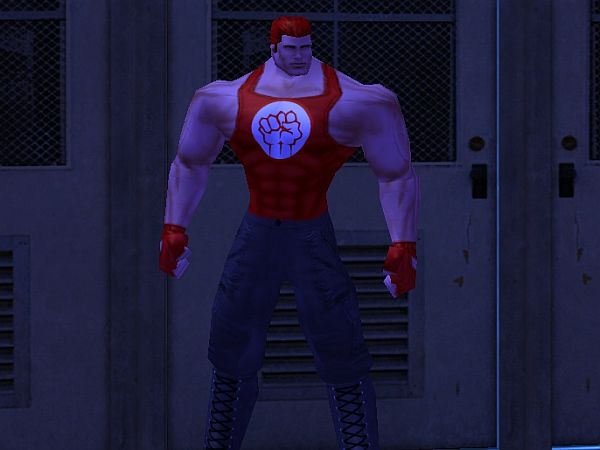Monday 4 June 2007

|
Pic of the day: Excessively muscled superhero from the game City of Heroes. Will today's subject grow up to something like this? Super-toddler?Here is a fascinating article about a super-strong toddler. Not quite up to the levels of Superbaby of the Silver Age of comics, but certainly something you would have had trouble believing if you read it in a novel. The toddler only has 40% more muscle mass than usual, but this is enough to cause "amazing feats of strength". Of course, toddlers are pretty active by nature, but even so. It seems that most of us get by on little more than the bare minimum. Why is this? Wouldn't this kind of strength be an obvious evolutionary advantage? Indeed, from the fossils of Neanderthals, it seems that they were far more heavily muscled than us. Not just the kind of difference that comes from a hunter lifestyle compared to an office lifestyle, but much more than even top athletes today, or their competitors from Homo Sapiens Sapiens, our own species, who lived side by side with them for a while. Adult apes, especially males, are also far more muscular than their human counterparts. A chimpanzee male, despite being smaller and lighter than a human, would be disastrous to meet in a wrestling match. It would most likely prove fatal to all but the strongest human. A gorilla could turn a rifle barrel into a corkscrew. An orangutan can casually throw himself from one tree branch to the next using the strength of an arm. It would seem that this is the default condition of great apes, and that we humans are the exception. Most likely this is yet another example of neoteny, the human tendency to retain traits that normally only are found in fetuses or babies of our closest genetic relatives. The article gives a pretty good hint at why exactly this happened, and why this kind of mutation has not quickly conquered back the lost terrain and spread to the whole human race. Even in a modern environment where obesity is more of a risk than starvation, the parents are hard pressed to put an ounce of fat on the toddler. And this fat is essential to building the human brain, which grows like crazy for the first couple years and then much more slowly. It consists to a large degree of fat, which acts as isolation around the billions of nerve endings. If you don't give your toddlers enough fat, they could literally become mentally retarded. (Let this be a warning to all you vegan parents out there, too!) For most of human history, families did not swim in energy-dense food like steak, cakes and cream. Hunter-gatherers frequently went through months of scarcity interspersed with months of plenty. Unfortunately the months of scarcity would prove disastrous to small children with extreme energy needs. Muscles burn calories even in standby mode, not to mention during exertion. And it is hard to imagine a toddler not exerting himself, anyway. In historical agricultural societies, food supply was more regular, but the diet contained less fat than we are used to. The great apes probably don't worry much about their brain. But how did the Neanderthals handle this challenge? The truth is that I don't know, and I haven't seen any discussion of it. Perhaps their brains grew more gradually. Their brains were actually larger than ours, but shaped differently. There may have been other differences. Perhaps they had a lower fat content, and may have functioned less efficiently compared to the size because of it. Again, hard to know. What little Neanderthal DNA we have is broken and fragmented. Unless we find a deep frozen Neanderthal somewhere, we may never know exactly. As for the Neanderthal lifestyle, they were hunters in the near-arctic areas around the Ice Age glaciers. The climate then was kind of strange by our standards. The glaciers extended much further south, to somewhere in Germany most of the time. (The edge moved back and forth with climate swings.) The energy input from the sun was not much lower than today, but the greenhouse effect was somewhat less, and the ice sheets reflected most of the sun that hit them back into space. So the climate near the glacier edge was unlike any we know: Cold but extremely fertile because there was always water from the glacier, and the strength of the sun was if anything greater because there were fewer clouds. The grasslands fed huge herds of animals, and it was here that the super-strong Neanderthals hunted. It was a dangerous life, especially when going up against mammoths, but with near human intelligence and amazing strength and stamina, they managed. It may be that the constant supply of meat let their children maintain a larger muscle mass. Or perhaps they were not born with the same condition as this modern child, but rather added muscle gradually as they grew up. I am sure this could be found out from the skeletons of Neanderthal children, of which several have been found, but I have never read anything about this particular aspect of their lives. Be that as it may, I think this may be the best of times to be born with muscular hypertrophy. It may even prove an evolutionary advantage -- at least if the man of steel doesn't try to hook up with a woman of Kleenex… |
Yesterday <-- This month --> Tomorrow?